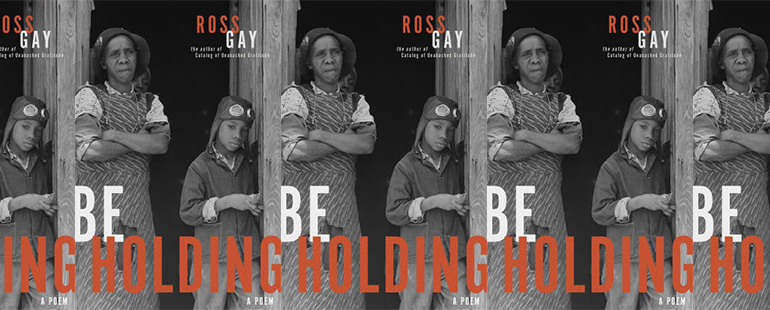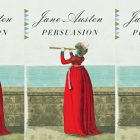On Be Holding

If Ross Gay’s 2015 collection Catalogue of Unabashed Gratitude associated the poet with a posture of thanks, confirmed in the 2019 Book of Delights, his most recent offering, Be Holding, published last fall, spins this theme of gratitude from a poetics to a politics. The work, a 95-page-long poem, is itself held between statements of thankfulness: the phrase “Bound in gratitude” begins the dedication and ends the acknowledgments. This gratitude encompasses a list of writers without whom, Gay insists in the dedication, “The poem does not exist”—Saidiya Hartman, Fred Moten, Christina Sharpe, and Susan Sontag, among others. Most of these names are repeated in the acknowledgments, which Gay begins with a thesis of sorts: “Nothing I write I write by myself: Everything I write, by which I mean everything, I write with and for and from others, which is a way of saying, always, debt. Which is a way of saying, always, gratitude. A way of saying, always, I am beholden.” Gay goes on to name dozens of influences, in some cases quoting lines that showcase his beholden-ness, which extend into a rich “lineage”: poets June Jordan and Amiri Baraka, ecologist Robin Wall Kimmerer, artist Carrie Mae Weems, theologian J. Cameron Carter, the inimitable Toni Morrison, and many other writers, artists, students, friends, family members, and “everyone I’ve ever talked about trees with” as well as “every tree that’s ever held me or listened to me or cared for me or fed me or cooled me or would.”
Gay situates this overflow of gratitude in explicit contrast to “the world-destroying horseshit capitalist nightmare fantasy of the individual” that pushes writers to imagine their selfhood as dependent on independent making, not the gifts of others. He situates community—“the lab of care and making”—as the opposite of this toxic capitalist individualism. In this way, highlighting all this poetic debt is a direct refusal of the anxiety of influence, a theory fomented by literary critic Harold Bloom in 1973, the year before Gay was born, which insists that writers inevitably compete with their literary ancestors to assert their own originality. Gay briefly admits to the prevailing expectation of individuality and originality but ultimately rejects it, concluding, “Oh shit, it’s all been given to me. It’s all been given to me. Oh. O. Thank you.” Whereupon follows nine pages of further acknowledgments.
The gratitude that holds the poem before and behind is not separate from the poem’s thematics; indeed, the line “Bound in gratitude” appears in its climactic final scene. In a sense, as Be Holding plays on the many possible resonances of its title phrase—borrowed from Sharpe’s In the Wake: On Blackness and Being—it constructs a community ethos of care that resists the entire capitalist nightmare fantasy of individual ownership: not just of ideas and poetic phrases, but of bodies and experiences. The poem ultimately suggests that within the horror show of objectified Black pain and the not-finished history of stolen Black bodies, the answer is a community that holds each other with care and beholds in Black lives not just suffering but life, dignity, complexity—and joy.
Be Holding is at one level a poem about the basketball player Julius Erving, or Dr. J, and his extraordinary 1980 baseline scoop, which Gay recounts watching repeatedly in slow motion, seeking to behold each detail. In a series of associations, often made through the register of trees, water, and the sky, Gay likewise narrates his looking at other images—in particular, three photographs—along with recollections from his childhood. These instances of beholding are woven through the poem’s narrative of Dr. J’s flight.
Gay’s particular reference to photography allows him to interrogate the ethics of witnessing, and the poem insistently plays on the violent undertones of photographic idioms. The first photo to which Gay refers is the famous image of a two-year-old Black girl and her godmother, somehow caught mid-fall when a fire escape collapsed, and his interpretation is damning. The photographer, he writes,
would win a Pulitzer Prize for spot photography
for shooting the woman
and the little girlcapturing her
staring at us
He notes that he cannot name the woman and girl because they are not named in the photograph’s title, which is either Marlborough Street Fire or Fire Escape Collapse, titles that suggest concern not for the lost people but for damaged property.
Gay connects this lack of care for the Black woman and girl’s lives to a longer history of white capitalist obsession with property when he compares the breaking fire escape to “a ship’s deck dismantling in a storm.” Here, as throughout the poem, Gay invokes the Middle Passage, connecting the photographic “capture” to the slave trade. Again and again, he repeats the lines “thrown overboard / for the insurance,” alluding to the ship The Zong, the crew of which threw 150 enslaved Africans overboard in 1781 when water ran low so the slavers could collect insurance money. The court case that followed, Gregson v. Gilbert, did not argue the morality of throwing humans to their deaths but whether the slavers were technically due the insurance money. M. Nourbese Philip’s book-length poem Zong! is constructed out of the words of the court document, bearing witnesses to the lives of those massacred, and Gay names Philip and her book in his acknowledgments (“Of course. Of course.”). Throughout the poem, Gay applies the repeated phrase—“thrown overboard / for the insurance”—to situations in which Black people are sacrificed for white consumption or economic gain.
Just as he never names the ship in the poem, Gay never uses the words “Middle Passage.” He also never names Black Lives Matter or its cry “I can’t breathe.” But Gay is perhaps most famous for his poem “A Small Needful Fact,” which commemorates Eric Garner’s breath-giving work with the “Parks and Rec. / Horticultural Department” and thereby mourns his murder-by-chokehold and the elevenfold “I can’t breathe” it wrung from him. Like the persistent allusions to Zong!, the repeated call to breath in Be Holding carries inescapably political connotations.
Gay’s call to breath—to breathe—is also an act of care for his readers. Within the poem’s endless sentence, periods appear exclusively within parenthetical asides, allowing for the poem’s only punctuational pauses. Gay writes these pauses into moments that threaten to retraumatize readers who are all too familiar with Black pain. The first comes as he describes the nameless little girl in a later photograph, one in which she is posed pointing at the picture of her fall. As Gay invites his readers to witness “the unwitnessable” in the willful photographic capture of this little girl’s retraumatization, he pauses between dashes to craft a community of caring:
But let’s breathe first.
We’re always holding our breath.Let’s stop and breathe,
you and me.
In this direct address to his readers, Gay invites them to attend to their own embodied wellness. Describing the imagined scene of a photographer directing the little girl to look at the first picture, Gay interrupts himself again: “—Come on now. Breathe.—”
Gay’s implied ethics of witnessing condemns not just the photographer but all who visit “the museum / of black pain,” including “white children / checking their phones.” As a white woman reading this book in a month often cast as a “museum / of black pain,” I must sit with the implications of Gay’s challenge. The next line sets up a noticing “we” in contrast to the unnoticing white children, but I cannot be assured Gay counts me among this “we.” In fact, he extends the critique even to himself:
I, too, am a docent
in the museum of black pain,if I might make a good salary,
paid vacations, benefits,if I might be building a home
of our painthrowing myself overboard
for the insurance
He goes on to ask, “what are we / trading in // what are we / looking at.” Later, he compares “this poem” to one of the cameras he questions. What is the answer to the risk implied in witnessing Black pain, not to mention benefiting from it?
Gay’s answer is an ethics of care, manifested not just in the invitation for his readers to breathe but in the minute attention he pays, again and again, to the images, video, and memories at the center of Be Holding. In the wake of the horror of the photograph of falling woman and child, Gay imagines the care the woman gave a plant in the photo, evidence of her irreducible humanity, and the care she gave the little girl, whom he imagines she might “scoop up” and “be / holding her as the moon / drifts into the horizon // of the building across the way.” He calls attention to the way her “arms outstretched” in the photograph “like one ready / to catch a child,” insisting with his careful gaze on recognizing the care the child received, her “tiny saddle shoe / perfectly tied.”
Gay brings a similarly careful attention to the figures and implied care in the second photograph he describes, this one of a grandmother and grandson. Gay sees poverty—the woman’s dress “toward the knee has two holes”—but also evidence of care: the boy’s “clean denim jacket,” “crisply rolled cuffs,” and “aviator hat’s goggles.” Gay, by proximity, relates this grandmother’s care—including her obvious awareness of the photographer’s aims to capture—to his “own white mother,” whom he recalls fiercely protecting him and his brother against racist commentary with the “knives” of her words: “my mother and her knives / make a garden.” He similarly memorializes the care of his father, who Gay remembers “held / my brother’s and my heads // through the crosswalk,” held flowers, held his sons above the water at the beach.
All these acts of holding, beholding, caring, attending, add up to “reaching toward / what you love.” This is
a practice
despite the hold,a practice that spites the hold
spites the overboard
This ethics of care resists the hold of the slave ship; it rejects the white supremacist logic of financial gain through black suffering. In fact, this holding and beholding can “fly some from the overboard,” connecting rescue from capture back to Dr. J’s majestic flight and others in the book.
The poem’s last ten pages turn to a third and final photograph in which “two women / run toward the camera,” “looking as though / descending a great staircase made of air with joy.” The photograph
does not capture or shoot anyone
does not fix anyonedoes not catalog or corral
or specimen or coerce,but holds them both
in their flight,moving as they are
In this kind of witnessing—beholding movement, beholding joy—Gay locates a community of “holding each other”; not holding one’s breath but holding each other’s breath, in a network of relations that is a “practice.” Gay repeats as the poem gallops to a close, its clauses mostly short, attending to the women’s photo, “we in here / talking about joy.”
In the final description of the women’s flight, the poem turns at last again to Dr. J, who after flying and making his extraordinary basket “falls / painlessly and temporarily.” The poem ends,
and we,
watching,reaching toward
each other,we breathe
The breath is not neutral; the generosity is not just nice; the reaching is not just pleasant. It is life-giving, life-saving. Gay’s poem theorizes an ethics that is inescapably political, and its ebullient gratitude, fore and aft, reads not just as an overflow of thankfulness but as a concrete practice of the ethics Gay suggests. It is the kind of practice that eschews literary competition and anxieties of influence; it is the kind of practice that, in contrast to a death-dealing drive to possess, gives and receives gifts—books, saplings, time, poetic lines—with open hands. This holding-each-other, this mode of beholding, is a regenerative alternative to the slave ship’s hold.
This piece was originally published on February 18, 2021.



